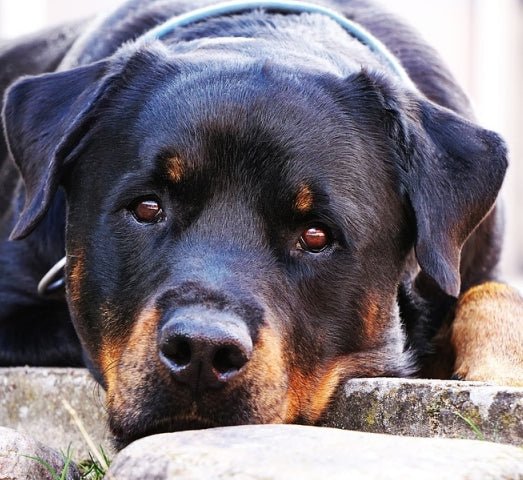I'll never forget the first time I heard this absolute absurdity directed at my sweet, 12-week old Rottweiler puppy. I was cottaging and had taken Quincey for a walk around the back roads of Bala. There was an RV stuck at a hilled fork in the road. A group of people had gathered around to take in the scene.
I noticed a woman with a Shepherd cross was standing at the side of the road and I was trying to decide whether walking by would be a safe endeavour for my young pup. As we approached the questions streamed through my mind - was this dog vaccinated? Was she healthy? Was she friendly? Our thoughts were cut short abruptly as the woman warned, "Oh, don't come any closer - she'll bite you to protect me." While I appreciated the warning, it took me aback. Why was I, a young woman walking by with a puppy, perceived as a threat to this dog? Who got to decide that I should be bitten to keep them safe: the dog or the woman? I didn't say anything, but the look on my face must have spoken volumes. The woman quickly said, "you'll want the same from your dog. You'll want her to protect you too."
I smiled and we carried on with our walk, but my brain was buzzing. Would I want Quincey to protect me? Would I be warning people off in everyday scenarios to ensure she didn't bite someone? How would I stop her from biting? Did she need to be mean to all of the good people in order to protect me in the unlikely event that we ran into the bad people? I started my research as soon as I got home. The prospect of having a dangerous dog who might hurt someone for just walking too close weighed heavily on me.
What is the answer?
This was years before I put on my dog trainers hat, so I didn't have an answer then. Quincey and I only had 2 weeks of puppy classes at McCanns under our belts at the time and as they say, the best was yet to come! Little did I know that that dog would steer my life directly off course and onto my true path. She made me fall in love with training and here I am almost 2 decades later in a very different field of work than I'd intended.
These days, I have the answers to those questions. I would now be able to stand up and vehemently appose this opinion. I read a comment on youTube recently in response to an old video I posted of Quincey. The comment was that if you want a guard dog, you must not socialize them in the home to ensure they'll bite intruders.
I know now with 100% certainty that that is the worst possible suggestion when owning a guard dog type of breed. It reminded me of the above scenario and practically demanded the writing of this post.
Should you allow any aggression?
Aggression is built into every dog be they Toy Poodle or Rottweiler and as such, it is our responsibility to maintain and control the level we require or are willing to allow. You may have a dog that you want to tug hard with toys so you can use it as a game and reward. This means you'll have to allow a certain level of aggression to be present when playing with toys. You'll assign rules to the play when a toy is present to ensure the aggression is controlled and safe. This dog will obviously not be allowed to play the same game with human skin or clothing and it should be their responsibility to be careful that their teeth never make contact with human skin. That would be dangerous. The toy should never be grabbed without permission and must be dropped on command for this game of aggression to work. This is controlled aggression. It's allowing a dog to bite, tug and pull with their teeth with permission in a controlled setting.
Is Breed-type an excuse for biting?

Whether it is a sporting dog with strong prey drive or a Rottweiler with a strong guarding instinct, if either is left unchecked, it could result in a dog who reacts and bites whenever they decide. What would you do with a dog with strong prey drive? Train it to listen despite the presence of small, fast moving creatures. What would you do with a dog with strong instincts to protect the home and their family? Socialize and train it to be accepting of strangers as well as your guests and visitors. You don't want a friend to be bitten just for visiting anymore than you'd want your dog chasing or hurting the neighbours Bichon Frise because it's quick and exciting. We train the dog we have using knowledge of breed predispositions.
Several years and thousands of happy encounters with strangers later, my well socialized and good tempered Rottweiler would show me that her instincts, while managed and under control, were still sharp and intact. While walking the same backroads in Bala, we were often stopped by people needing directions since our area was quite confusing. This scenario presented itself dozens of times while I was out walking dogs. Quincey always regarded all of the confused drivers with the same gentle gaze and happy, slow bum wiggle as she waited for the chance to either say hello or continue walking. There was one distinct incident that was set apart. A large pick-up truck pulled up and the door started to open. Quincey immediately went on alert, hackles up and a deep growl came out that was unlike any growl I'd ever heard from her before. For reasons unknown, we were both immediately ill at ease by the person who pulled up. The man took one look at her, closed the door and sped off throwing up dust, dirt and rocks as he did. To this day, I have no idea what his intentions were, but neither Quincey or myself wanted to find out and the aggressive way he arrived and drove off told me I was better off not knowing. What I did know for sure was that given the need, Quincey would protect. Another situation that springs to mind was Quincey making a big deal out of a night at the cottage that to my perception was quiet. She made an awful racket trying to make her presence known to something. We shushed her and told her she was being silly. The next morning, there were giant bear paw prints on the door of my truck. Again, her instincts were there and much sharper than mine. She did what she needed to do, but because of her good training, never any more than was required.
Quincey went on to live a solid and wonderful 11 years. When she passed, it was lovingly and peacefully in my arms with the assistance of a vet. She never once bit or hurt any human or other creature. She was a joy to love and a true teacher to me in ways I could never do justice to in a written description. In the times I needed her presence known, I never had to ask her. Despite being a sweetheart, she knew how to protect when the situation called for it.
Any dog can do terrible damage if they bite, but the larger and stronger the breed, the more likely they are to do debilitating damage. All dogs can bite. That's a fact! They all must be controlled so that they won't! Dogs who are more likely to bite due to the genetic contribution of a guarding instinct require extreme socialization and training to ensure they are on the right track to never biting indiscriminately.
What would I say if presented with the same questions today?

Will I want my dog to protect me? Yes, but only if I give her clear signs that I need her to. Any other time, I'll rely on her presence to be enough of a deterrent from those who may want to do me harm.
Having lived with a guard dog type, I know that natural instincts will kick in if and when the need arises. My job is to curtail those natural instincts and stop my dog from assuming a bite is necessary. It's my responsibility to ensure the safety of all good people my dog may come into contact with. That way we can both relax and enjoy our time together and make friends with the good people who cross our paths. Quincey made an abundance over her lifetime!
Do you have a sweet guard dog who can still do their job? Tell us about them in comments!
Happy training!

